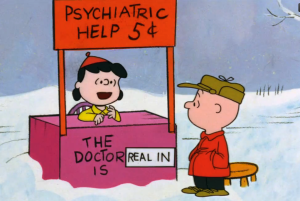Mental Health Awareness Day (Another Post About Depression)
October 10 is Mental Health Awareness Day. If you’re a regular reader, you probably already know I’ve been dealing with depression for a while now. Got the official diagnosis back in April of 2012. Started on antidepressants the next month. Began seeing a counselor shortly after that.
The depression had been there a lot longer. I remember feeling suicidal as a kid, and getting close enough to scare myself at least twice. Looking back, I can see stretches where the brain weasels got the best of me in college too, and they had a good old time messing with my head the year I spent living in Nevada.

The pills helped to stabilize my mood and get me back to a healthier baseline. The counselor helped me make some changes with my life. Neither of these things actually fixed or cured the depression. Like my diabetes, it’s still there - I’m just doing a better job of managing it.
Unlike the diabetes, I can’t take a drop of blood and measure how Depressed I am today. Wouldn’t that be nice? “My Depression Level is 193. Better watch a half hour of kitten videos.”
A big difference in my pre- and post-diagnosis life is that I now know the brain weasels are there. I’m better at recognizing when I’m just having a lousy day vs. when the Depression is getting the upper hand. Being able to identify the problem, knowing it’s real, helps a lot.
But it doesn’t make the problem go away. I know it’s there, and I know there are cracks in my mental health the brain weasels can sneak through. To choose a totally hypothetical example, say a book I’m working on is going a lot more slowly than I want…
One of the best things I’ve learned over the past six years is that I’m not alone. Since I started talking about the depression, I’ve spoken with a lot of people who are fighting the same disease. Others are battling different mental illnesses. And none of us are alone in that fight, even though the brain weasels will totally lie and try to make you think you are.
#
Lesson One: Depression lies. It says you’re alone, you’re unworthy of love, your failures are deserved and your successes are flukes, your happiness is fleeting but sadness is eternal, your problems are inescapable, and things will never get better. It’s all lies.
Lesson Two: Mental illness is real. You know, I had zero problem going to the hospital for my diabetes back when I was diagnosed. My blood sugar was over 600 at one point. It didn’t matter how strong or determined or optimistic I was if my pancreas was taking early retirement.
Mental illness is just as real and valid as any other. Willpower won’t make my pancreas start working. Willpower also won’t rebalance the chemical makeup of my brain. There are things I can do to help - exercise can be a useful tool for both diseases - but it won’t cure the problems.
People get sick. That doesn’t make you a failure, and it’s not your fault.
Lesson Three: Getting help is … helpful. Going to the doctor and the counselor was hard. Really hard. But it made a huge difference. It may have saved my marriage. It helped my relationship with my kids, and with the other people in my life. It helped my writing.
It may take time to find a doctor and/or therapist who’s the right fit. If you go on medication, it may take time to find the right dosage and the right med or combination of meds. And some health insurance plans can be a nightmare.
But if you can, it’s worth reaching out for help.
#
For those in the U.S., Mental Health America has what looks like a good set of tools for getting started, including screening tools and steps to find help. MentalHealth.gov has some resources as well.
Be kind to yourself. You deserve health and happiness.
Mirrored from Jim C. Hines.